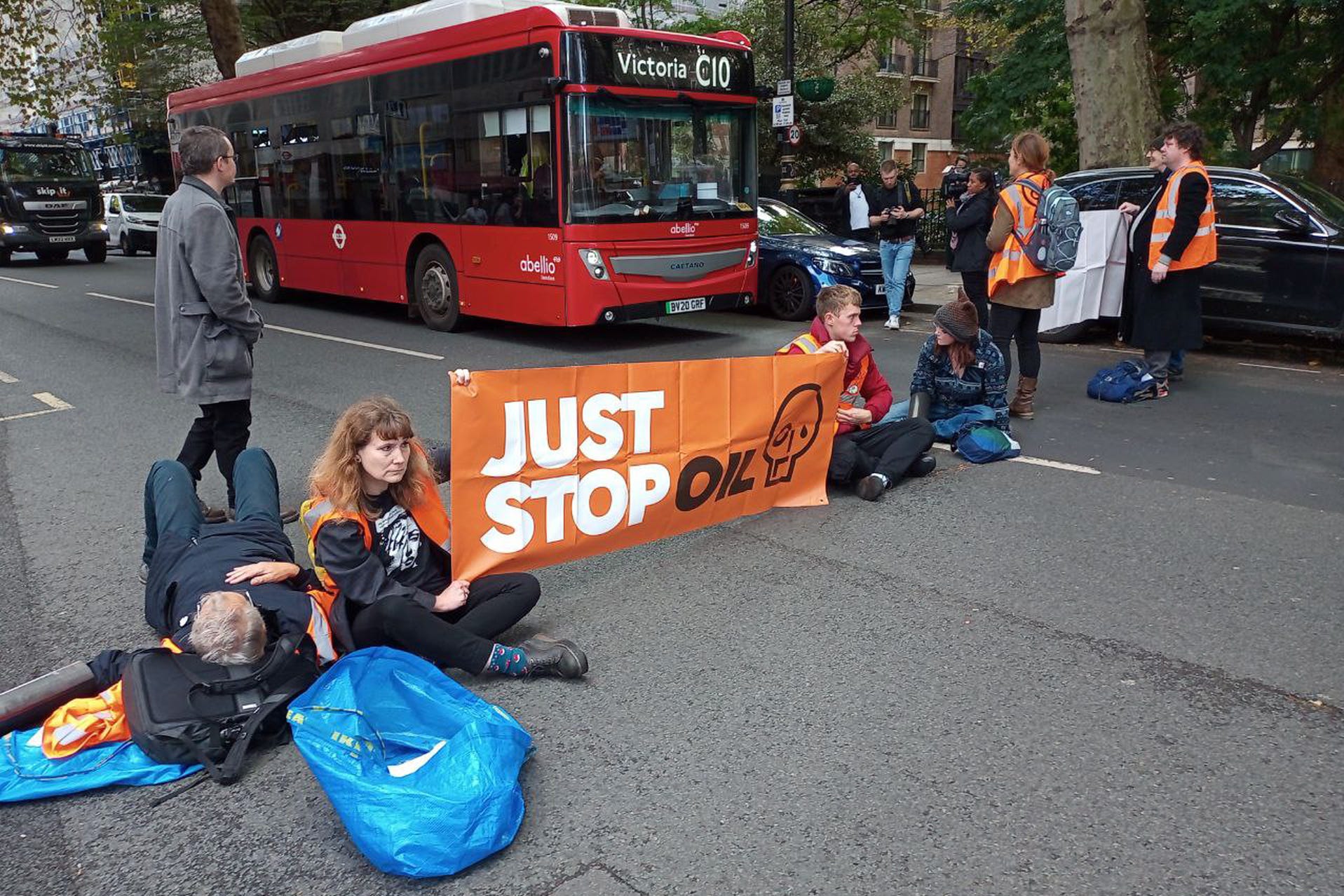Rishi Sunak backs tougher police powers to shut down protests before they get disruptive
Outrage from civil liberties groups over fresh attempt to curb ‘guerrilla’ tactics

Police could be allowed to intervene before protests become highly disruptive, under new measures set to be considered in parliament, Rishi Sunak’s government has confirmed.
An amendment to the Public Order Bill, to be introduced on Monday, will aim to give police greater clarity about when they can intervene to stop demonstrators blocking roads or slow marching.
The proposals – aimed at curbing the tactics used by activists groups such as Just Stop Oil and Extinction Rebellion – come after police chiefs claimed there is some uncertainty over what can be currently classed as “serious disruption” under existing law.
According to No 10, under the proposed changes, police would not need to wait for disruption to take place and could shut demonstrations down before they escalate.
Human rights group Liberty said the plan was an attack on the right to protest, while Labour said the changes were unnecessary and accused the Sunak government of trying to “grab the headlines”.
Liberty director Martha Spurrier said: “Allowing the police to shut down protests before any disruption has taken place simply on the off-chance that it might sets a dangerous precedent, not to mention making the job of officers policing protests much more complex.”
No 10 said police, as part of the mooted changes, would not need to treat a series of protests by the same group as standalone incidents, but would be able to consider their total impact.
Officers would be able to take into consideration long-running campaigns designed to cause repeat disruption over a period of days or weeks.
Giving his support to the measures, Mr Sunak said: “We cannot have protests conducted by a small minority disrupting the lives of the ordinary public. It’s not acceptable and we’re going to bring it to an end.
The PM added: “The police asked us for more clarity to crack down on these guerrilla tactics, and we have listened.”
Labour leader Sir Keir Starmer said he did not think the changes were necessary, arguing that the police already had the “power to act” on disruptive protests and suggesting the Sunak government was simply trying to “grab the headlines.”
“I am as strong as anyone in arguing we need to take action against Just Stop Oil – gluing yourself to the road … stopping ambulances getting through – wrong, deeply arrogant and I want the police to act,” he told LBC.
“If I was prime minister instead of more headline-grabbing legislation, I would get the chief constables into a room, sit them down with me and say, ‘Right, what’s the problem?’,” said the Labour leader.
Sir Keir added: “My worry with this government that for every problem, there answer is always legislation. Get on with what you’ve got.”
Labour peer Baroness Chakrabarti warned that the “draconian” Public Order Bill could treat all peaceful dissent as “effectively terrorism”.
The ex-director of civil rights group Liberty told BBC Radio 4’s Today programme: “This, I fear, is treating all peaceful dissent as effectively terrorism and this bill looks very similar to anti-terror legislation we’ve seen in the past.
“This degree of pre-emption will basically shut down what isn’t even causing disruption at all because their definition will set such a low bar.”

The Just Stop Oil group said the proposal was “a sinister and authoritarian attempt to undermine the basic human rights that underpin our democracy”.
Anna Birley, co-founder of the feminist campaign group Reclaim These Streets, said: “Handing new powers over to the police to decide who’s allowed to protest is incredibly dangerous – the High Court case we won against the Met showed just how ill-equipped they are to make those judgments.
However, Metropolitan Police commissioner Sir Mark Rowley also gave his backing to the proposals, which would broaden the legal definition of serious disruption.
I welcome the government’s proposal to introduce a legal definition of 'serious disruption' and 'reasonable excuse'
“It is clearly understood that everybody has the right to protest,” he said. “Increasingly, however, police are getting drawn into complex legal arguments about the balance between that right to protest and the rights of others to go about their daily lives free from serious disruption.
“The lack of clarity in the legislation and the increasing complexity of the case law is making this more difficult and more contested,” he added.
Sir Mark added: “In practical terms, parliament providing such clarity will create a clearer line for the police to enforce when protests impact upon others who simply wish to go about their lawful business.”
The Public Order Bill is considered a successor to the controversial Police, Crime, Sentencing and Courts Act passed last year, which was criticised for introducing curbs on the right to protest.
The bill is currently undergoing line-by-line scrutiny in the House of Lords, which will be tasked with debating the amendment.
MPs previously backed a cross-party amendment to the bill aimed at setting up buffer zones around abortion clinics, in a bid to offer greater protection to women by preventing protesters from gathering.



